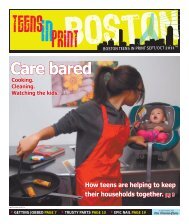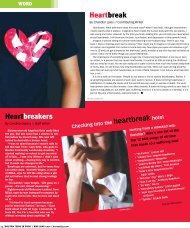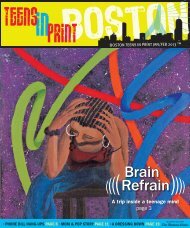i^_cc[ho - Teens in Print
i^_cc[ho - Teens in Print
i^_cc[ho - Teens in Print
- No tags were found...
You also want an ePaper? Increase the reach of your titles
YUMPU automatically turns print PDFs into web optimized ePapers that Google loves.
P<strong>ho</strong>to by: Leon WhitseyAs a s<strong>in</strong>gle mother com<strong>in</strong>g out of adomestic violence situation, I wouldlike to provide a better future for my 2-year-old son, Abraham. I do not want toworry about where we are go<strong>in</strong>g to liveor <strong>ho</strong>w we are go<strong>in</strong>g to survive. I wantto do someth<strong>in</strong>g I am passionate about,someth<strong>in</strong>g that makes a difference <strong>in</strong> theworld and the lives of others, and mostimportant, someth<strong>in</strong>g that will make a difference<strong>in</strong> my son’s life. This is the reasonI am aim<strong>in</strong>g to go to college. I want to bea good role model for Abraham. I do notjust want to tell him to be a su<strong>cc</strong>essfulperson. I want to s<strong>ho</strong>w him, by do<strong>in</strong>g itmyself.I grew up <strong>in</strong> Venezuela surrounded bypoverty. I remember <strong>ho</strong>w difficult it wasto survive. I watched my mother struggleto take care of her family and I saw <strong>ho</strong>whard it was because she had no education.It broke her heart when my brothersstopped go<strong>in</strong>g to sc<strong>ho</strong>ol <strong>in</strong> order to helpmake ends meet at <strong>ho</strong>me. I will not allowthe same th<strong>in</strong>g to happen to me. Or toAbraham.I am proud to be the first one from myfamily to graduate from high sc<strong>ho</strong>ol andgo onto college and I know my family willbe very proud to see me achieve my academicgoals and a college degree.I am passionate about education.Knowledge br<strong>in</strong>gs wisdom and a senseof responsibility <strong>in</strong>to a person’s life. Themore educated a person is, the moreaware a person becomes of issues <strong>in</strong> theworld. Go<strong>in</strong>g to college is a way to learnwhat issues affect our society and whatwe can do to help. This is why attend<strong>in</strong>gcollege is vital for me.[PREZ CANDIDATES, FROM PAGE 1]climate, and tells mostpeople, teens <strong>in</strong>cluded,everyth<strong>in</strong>g they knowabout politics and politicians.Of course, thismeans media has a hugeeffect on the knowledgeof the average Americanand on the way she orhe votes. Media hasshaped much of thedissatisfaction youngpeople feel with the currentadm<strong>in</strong>istration. Witha presidential electioncom<strong>in</strong>g up, it’s importantto exam<strong>in</strong>e the effect themedia will have on theNovember race for theWhite House.Media coverage ofthe presidential race isless focused on issuesand more on candidates,a<strong>cc</strong>ord<strong>in</strong>g to MelissaThreadgill, director ofcommunications forMassEquality, w<strong>ho</strong> spokewith T.i.P. <strong>in</strong> a recentp<strong>ho</strong>ne <strong>in</strong>terview. “Theydon’t spend nearly asmuch time on the actualissues. They cover theraces <strong>in</strong> terms of campaigns,not substance.”With cameras presenteverywhere the candidatestravel, media imag-Artwork by: Artists for Humanityes play an important role<strong>in</strong> the way a candidate is perceived, and actual issues seemto be placed on the back burner when compared with <strong>ho</strong>wa candidate looks on TV. Television made this the new reality<strong>in</strong> 1960, when the public saw a handsome, calm JohnF. Kennedy debate a nervous, sweaty Richard Nixon. Theelection went to Kennedy; many believe the media has hada huge <strong>in</strong>fluence on politics ever s<strong>in</strong>ce.“The media’s portrayal of presidential candidates, or anyperson of political power, has always been a way of distort<strong>in</strong>g[them] <strong>in</strong>to images that the public either wants ordoesn’t want,” says Zach Page, 17, of Boston.This k<strong>in</strong>d of publicity is comparable to the publicitygiven to someone like Britney Spears. Even with her nameall over the tabloids, the sales of her latest album weredisappo<strong>in</strong>t<strong>in</strong>g <strong>in</strong> comparison to her former efforts. Thiscan happen <strong>in</strong> politics, too. In 2004, when former Vermontgovernor Howard Dean became overzealous dur<strong>in</strong>g one ofhis presidential campaign speeches and made an unusualnoise dur<strong>in</strong>g his speech, the cameras caught it and playedit frequently, until it essentially ended his s<strong>ho</strong>t to be theDemocratic nom<strong>in</strong>ee.Threadgill says because the media is always there,“Th<strong>in</strong>gs like that happen <strong>in</strong> any race and these th<strong>in</strong>gs getmagnified. [Candidates] ga<strong>in</strong> more attention. People hearmore about them.” And when media is present, all publicitydoes not turn out to be good.The media can create a mold of someone’s identity wit<strong>ho</strong>uttheir control, but candidates, like pop stars, can usethe cameras to their advantage. When Spears wants to sellperfume, she s<strong>ho</strong>ots a commercial and makes sure it isaired on heavy rotation on several TV channels. Candidatesdo the same th<strong>in</strong>g, buy<strong>in</strong>g heavy blocks of advertisementsso they can criticize their opponents. Some candidates c<strong>ho</strong>osenot to run negative campaigns but they are <strong>in</strong> the m<strong>in</strong>ority.Another component of media’s effect on politics is poll<strong>in</strong>gand publish<strong>in</strong>g the results. “[The media] focuses on what’sknown as the <strong>ho</strong>rse race, or w<strong>ho</strong>’s up <strong>in</strong> the polls,” saysThreadgill. But sometimes the polls are wrong. For example,polls predicted that Hillary Cl<strong>in</strong>ton would lose the NewHampshire primary, but she ended up w<strong>in</strong>n<strong>in</strong>g. When Cl<strong>in</strong>tonabandoned her usually stoic persona and began to cry whilethe cameras were roll<strong>in</strong>g, pundits were sure it would cost herthe primary.“The first major piece of media that was <strong>in</strong>volved was whenCl<strong>in</strong>ton had her sensitive moment,” says Derrick Jackson,columnist with The Boston Globe, w<strong>ho</strong> has covered the campaignsof many presidential candidates dur<strong>in</strong>g his career.Despite the media’s power, people tend to be more affectedby meet<strong>in</strong>g candidates or attend<strong>in</strong>g their speeches. “For manypeople, the deal was sealed by the last candidate they saw. Themore that there is human contact, the less often that someone’spre-set stereotypes come <strong>in</strong>to play,” says Jackson.The catch, of course, is that most people don’t end up meet<strong>in</strong>gcandidates <strong>in</strong> person. The impression voters have of candidatesis formed mostly by their media image.As <strong>in</strong> the enterta<strong>in</strong>ment world, where everyth<strong>in</strong>g we knowabout celebrities is based on what the media captures, adultsand teens w<strong>ho</strong> follow politics are grow<strong>in</strong>g more dependent onthe media for <strong>in</strong>formation.i.


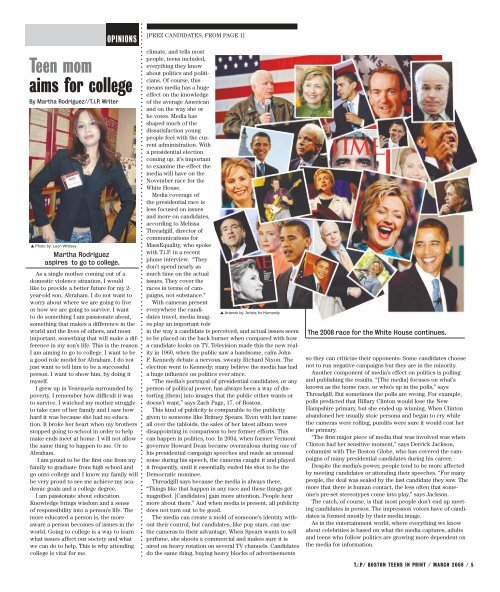
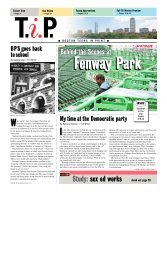
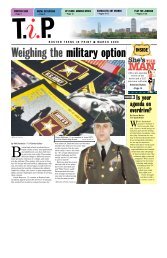
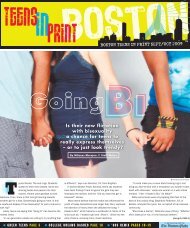
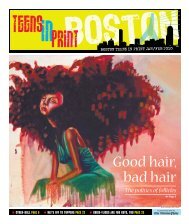
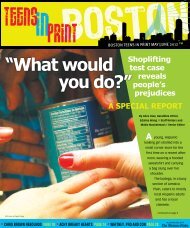


![=bWceh_p_d] j[[d fh[]dWdYo - Teens in Print](https://img.yumpu.com/42327830/1/190x229/bwceh-p-d-jd-fhdwdyo-teens-in-print.jpg?quality=85)

